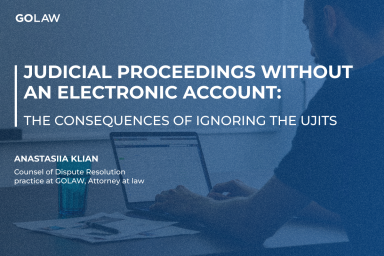EPC contracting in Ukraine: implementation features and risks
Tags
Contents
Given its long history, clarity and good reputation, EPC contracting increases bankability and improves investment prospects of the project.
Standard EPC contract forms developed by the International Federation of Consulting Engineers (hereinafter the “FIDIC”) are being used increasingly frequently for the purposes of investment and construction projects in Ukraine.
The pro forma contracts developed by the FIDIC are trusted by all parties of the construction as well as other stakeholders crucial to such projects – credit and international financial institutions, including the European Investment Bank, EBRD, World Bank, etc. Given its long history, clarity and good reputation, EPC contracting increases bankability and improves investment prospects of the project.
What makes EPC Contracts special?
There are various types of FIDIC contracts that are divided into books: Red Book, Yellow Book, Silver Book etc. based on different functions, needs of the project and contracting parties’ cooperation models.
FIDIC pro forma contracts are based on balance of interests of the parties. They regulate vast majority of issues that may arise during engineering, procurement and construction in sufficient detail. These documents are simple, well structured and do not require drafting of separate contract, however they may be amended by the parties if necessary.
Contractor’s turnkey responsibility principle makes EPC contracts convenient and attractive for employers. EPC contract is based on concentration of three elements of the project implementation in hands of one person (contractor): Engineering, Procurement (of equipment and materials), and Construction. Thus, the contractor under the EPC contract undertakes to deliver an operational facility to the employer on a turnkey basis. At the same time, the EPC contract is beneficial for the contractor too as a higher price may be set for the integrated chain of services and profit optimisation.
EPC contracts vs Ukrainian law
In practice, the parties usually define that the EPC contract is governed by the English law or other foreign jurisdictions. The Ukrainian law does not contain a comparable to the EPC contract. Within the meaning of the Ukrainian law, the EPC contract is a mixed contract, which contains terms and conditions of several types of contracts: on engineering services, construction, design work, and supply. Therefore, if parties determine that the EPC contract is governed by the Ukrainian law, all the law-established essential conditions of the abovementioned contracts shall be included into the text thereof. Furthermore, standard terms and conditions of the international EPC contract shall be reviewed as they contain the concepts and provisions that fail to comply with Ukrainian law.
For instance, let’s consider the concept of “liquidated damages” used in EPC contracting to set the amount of the parties’ financial liability. Liquidated damages are a fixed amount that the party undertakes to pay for delayed performance of works or other obligations per each day of delay.
As there is no definition of term “liquidated damages” in Ukrainian law, there is a risk that collection of such liquidated damages will be impossible or very difficult in case of litigation.
Such mismatches shall be taken into consideration if the contract is governed by the Ukrainian law.
Things to consider when entering into an EPC contract
Despite the fact that the Ukrainian construction market players are already familiar with EPC contracts, employers do not always know what to expect from such contracts. There are several key provisions shall be taken into consideration when entering into the EPC contract and for improving bankability of the project.
Fixed price of the project implementation and limitations on increasing the price.
EPC contract price is usually fixed and set as a lump sum, which imposes more risks on the contractor and gives certain assurance of the final cost of the project. However, the fixed price may change under certain circumstances.
In particular, standard FIDIC contractual terms and conditions entitle the contractor to demand from the employer to pay additional costs in case of variations (changes in the nature of works, change of the project, scope and quality of the works etc.), changes in the legislation, contractor’s costs incurred by the contractor resulting from the employer’s delay or non-fulfilment of obligations, etc.
In this case, the contract often provides for the possibility of additional collection of “reasonable profit” (which is usually 5 to 15 % of the amount of costs) from the employer alongside with such costs. Such clauses may cause an uncontrolled and unpredictable contract price growth.
Therefore, it shall be ensured that vast majority of risks of unexpected costs are assigned to the contractor. At the same time, the circumstances under which the contractor may increase the contractual price shall be exhaustive and clear. Moreover, a cap for maximum increase in the contractual price should be set.
Fixed time for completion and limitation of its extension
EPC contracts usually set the fixed time frames for the works, however, they provide for possible extension of time for completion in certain cases such as variations, exceptionally adverse weather conditions, unexpected lack of staff and materials caused by epidemics or acts of the government, or any delay caused by the employer’s fault.
As above, the common recommendation will be the following: employers shall limit and expressly define in a contract the exhaustive list of events entitling the contractor to an extension of time for completion. Additionally, the contract shall not contain wordings with varying interpretations. For instance, the standard text of the EPC Yellow Book does not define the meaning of “exceptionally adverse weather conditions”, which may be a basis for extension of time for completion. This often leads to misunderstanding and litigations between the contracting parties as to the existence of such event.
Moreover, the contract should include a clause on the “concurrent delay”, which prevents unjustified extension of time when there are two or more causes of delay and at least one of those causes would not entitle the contractor to an extension of time under the general extension of time clause. For instance, if there is a delay which occurred due to the contractor’s fault, and there is also a delay caused by the employer’s actions during the period of the initial delay, the contractor shall not be entitled to an extension of time to the extent of concurrency as the employer’s actions in this case do not actually affect the time for completion. Lack of this clause in the contracts may result in unreasonable extension of time.
Security
Adequate security for fulfilment of the contractor’s obligations is a prerequisite for mitigating the employer’s and prospective investor’s risks. The exact nature of security may vary.
In order to secure the contractor’s obligations, the contract may contain a “retention clause”, which entitles the employer to retain a certain percentage (5 to 15 %) from each payment. Such funds are accumulated and payable to the contractor at later stages of the project, upon expiration of the warranty period, or subject to fulfilment of the other contractual terms and conditions.
Security can also be in a form of a bank guarantee obtained by the contractor for the employer’s benefit, the amount of which is generally 5 to 15 % of the contractual price. The exact amount of the guarantee shall be determined individually in each particular case upon consideration of number of different factors including: existence of any other security, payment schedule, contractor’s reputation, solvency, risk of the contractor’s default etc.
Furthermore, the balance of the parties’ rights is often ensured by using several separate security types at different project stages with different grounds for collection or release. For instance, the contract may provide:
- an advance payment guarantee, which is given prior to commencement of the works in the amount of the advance payment (if it is provided for by the contract) and remains effective until a specific stage of the works;
- a performance guarantee in the amount of 5 to 15 %, which is issued prior to commencement of the works and remains effective until the facility is constructed and taken over by the employer;
- a warranty bond, which remains in force during the warranty or defects notification period and secures the contractor’s obligations to remedy the defects after acceptance of the works.
An option to receive a Parent Company Guarantee shall be considered as well. It is a guarantee of the affiliated entity of the contractor which provides that it will perform the contractor’s obligations if, for whatever reason, the contractor does not perform.
Regardless of the selected method for securing the obligations, the contract shall set clear and enforceable terms and conditions for foreclosure on the security.
Contractor’s liability
Another important issue is the contractor’s liability for delay and failing to achieve the estimated design capacity parameters or other performance indicators of the project. No limits of the contractor’s liability or setting them at a maximum level (preferably as close to the total price of the contract as possible) will increase the project’s bankability.
If the contractor also acts as an operator under the O&M contract, the contract shall ensure that potential manipulation and shifting off liability or risks under the EPC or O&M contracts are avoided. For instance, penalties under the O&M contract may be much lower than the ones provided for by the EPC contract. This way, the contractor will try to evade liability under the EPC contract and be imposed lower penalties under the O&M contract. In order to avoid this, the EPC contract should forbid release of the contractor and the operator from the liability resulting out of or in connection with breach of any of the contracts.
It should be noted that EPC contracts usually contain some of the abovementioned requirements, however standard clauses must be carefully reviewed in line with law, modified, supplemented and specified on a case-by-case basis with consideration of projects’ peculiarities.
Scope of works
Contractors seek to submit the most attractive and competitive bid to win over the contract. However, following the detailed analysis it often turns out that the specified price includes the limited scope of works. Consequently, the price of the contract may further increase due to the “additional” works necessary to commission the facility. It is recommended to specify the contractor’s obligation to perform all the works provided for by the project documentation in the EPC contract in order to avoid such situations.
Project design documentation
One of the hidden pitfalls of the EPC contract with a foreign contractor is standard engineering clauses of the EPC contract. The difference in approaches to construction engineering (design works) in Ukraine and other countries and its regulation shall be taken into consideration.
A foreign contractor may underestimate the scope of the engineering works or fail to take into account the requirements of the Ukrainian law to the scope and content of the design documentation or the need to adapt the project design, as it often treated as internal document. Such circumstances greatly affect the project implementation time frames. Given the above, the EPC contract shall contain the full scope of the necessary project documentation and the requirements according to which the contractor shall perform the work.
Things to consider when selecting the contractor
Selecting a contractor is one of the most crucial points of the project implementation. Many employers make common mistakes at this stage. In order to avoid failure of the project because of the selected contractor the following basic rules shall be adhered:
First of all, the contractor must be experienced in implementation of similar projects considering scope and technologies used. Secondly, the contractor must have a pool of local subcontracts, experience and history of cooperation with them. Thirdly, the contractor must be familiar the local engineering and construction rules.
As the contractor’s financial liability almost never exceeds its remuneration and does not cover all the employer’s expenses, engagement of the inexperienced contractor may hinder implementation of the project and cause damages for the employer equal to the project’s price.
Lack of experience of cooperation with local subcontractors and lack of understanding of local construction and engineering rules and regulations always causes delays, which might result in no pay-back within the project in some cases (for instance, when renewable energy facilities are constructed).
Therefore, proper contractual strategy combined with the balanced approach to selection of the contractor is a prerequisite for successful project implementation.
The article has been published in the Yurydychna Gazeta

Sergiy Oberkovych
Senior Partner, Attorney at law
- Contacts
- 31/33 Kniaziv Ostrozkykh St, Zorianyi Business Center, Kyiv, Ukraine, 01010
- s.oberkovych@golaw.ua
- +380 44 581 1220
- Recognitions
- The Legal 500 EMEA 2023
- Who’s Who Legal 2022
- Lexology Index: Corporate Tax 2024
Sign up to be aware
New achievements are inspired by information. GO further, don’t miss out GOLAW news and legal alerts
Our expertise
-
- Antitrust and Competition
- Banking and Finance
- Compliance, Corporate Governance and Risk Management
- Corporate and M&A
- Criminal and White Collar Defence
- Defense in Anti-corruption procedures and regulations
- Labor and Employment
- Natural Resources and Environment
- Government Relations (GR)
- Insolvency and Corporate Recovery
- Intellectual property
- International trade
- Legal support of business and private Сlients in Germany
- Litigation and dispute resolution
- Private clients
- Real Estate and Construction
- Energy and Natural Resources
- Restructuring, Claims and Recoveries
- Martial Law
- Tax and Customs
-
- Agribusiness
- Aviation
- Chemical industry
- Engineering, Construction and Building Materials
- Natural Resources and Environment
- Financial institutions
- IT and AI
- Industry and manufacturing
- Healthcare industries, Life sciences and Pharmaceuticals
- Media, Entertainment, Sports and Gambling
- Retail, FMCG and E-Commerce
- Transport and Logistics
We use cookies to improve performance of our website and your user experience.
Cookies policy
Cookies settings







